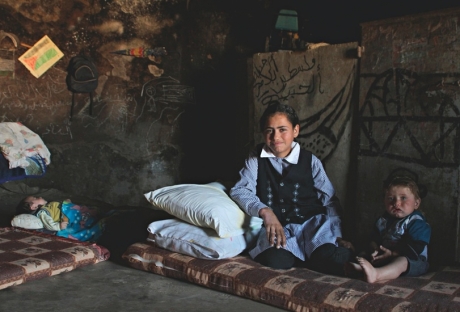Nawal Jabarin wants to be a doctor when she grows up. For now, she lives in a cave with 14 siblings, in constant fear of military raids. We meet the Palestinian children living under Israeli occupation.Posted by Friends of Al-Aqsa / Tuesday, 11th February, 2014
The rough track is an unmarked turning across a primeval landscape of rock and sand under a vast cobalt sky. Our Jeep bounces between boulders and dust-covered gorse bushes before beginning a bone-jolting descent from the high ridge into a deep valley. An Israeli army camp comes into view, then the tiny village of Jinba: two buildings, a few tents, a scattering of animal pens. A pair of military helicopters clatter overhead. The air smells of sheep.
At the end of this track in the southern West Bank, 12-year-old Nawal Jabarin lives in a cave. She was born in the gloom beneath its low, jagged roof, as were two of her brothers, and her father a generation earlier. Along the rock-strewn track that connects Jinba to the nearest paved road, Nawal’s mother gave birth to another baby, unable to reach hospital in time; on the same stretch of flattened earth, Nawal’s father was beaten by Israeli settlers in front of the terrified child.
The cave and an adjacent tent are home to 18 people: Nawal’s father, his two wives and 15 children. The family’s 200 sheep are penned outside. An ancient generator that runs on costly diesel provides power for a maximum of three hours a day. Water is fetched from village wells, or delivered by tractor at up to 20 times the cost of piped water. During the winter, bitter winds sweep across the desert landscape, slicing through the tent and forcing the whole family to crowd into the cave for warmth. ‘In winter, we are stacked on top of one another,’ Nawal tells me.
She rarely leaves the village. ‘I used to ride in my father’s car. But the settlers stopped us. They beat my father before my eyes, cursing, using foul language. They took our things and threw them out of the car.’
Even home is not safe. ‘The soldiers come in [the cave] to search. I don’t know what they’re looking for,’ she says. ‘Sometimes they open the pens and let the sheep out. In Ramadan, they came and took my brothers. I saw the soldiers beat them with the heel of their guns. They forced us to leave the cave.’
Despite the hardships of her life, Nawal is happy. ‘This is my homeland, this is where I want to be. It’s hard here, but I like my home and the land and the sheep.’ But, she adds, ‘I will be even happier if we are allowed to stay.’
Continue reading at Friends of Al Aqsa, via link below.

